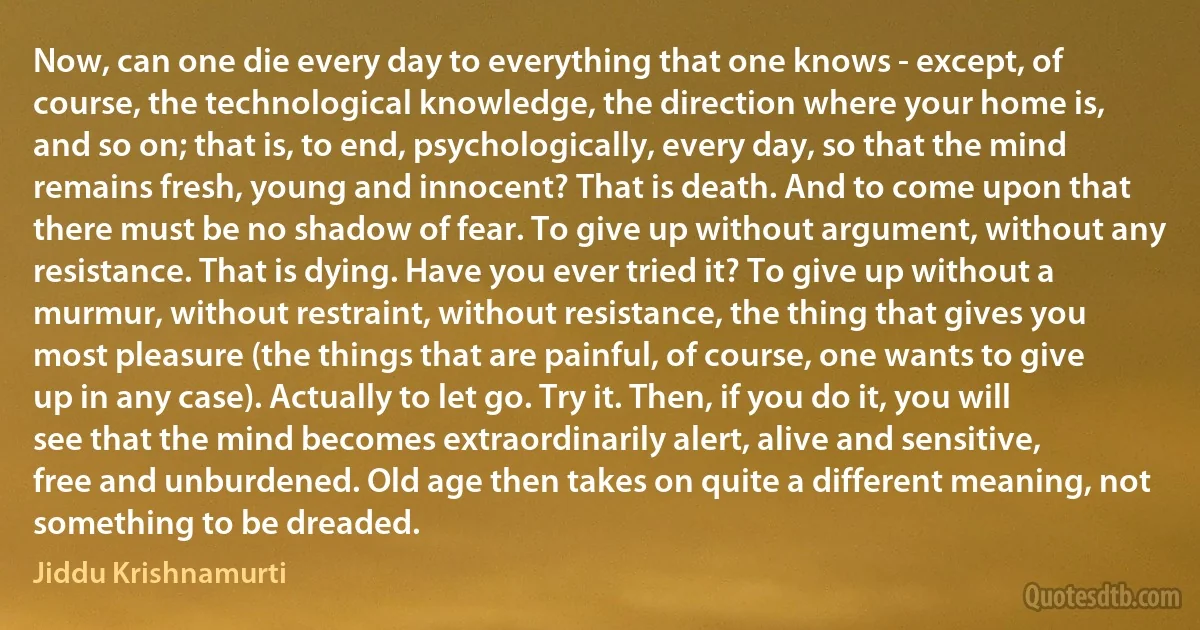
Now, can one die every day to everything that one knows - except, of course, the technological knowledge, the direction where your home is, and so on; that is, to end, psychologically, every day, so that the mind remains fresh, young and innocent? That is death. And to come upon that there must be no shadow of fear. To give up without argument, without any resistance. That is dying. Have you ever tried it? To give up without a murmur, without restraint, without resistance, the thing that gives you most pleasure (the things that are painful, of course, one wants to give up in any case). Actually to let go. Try it. Then, if you do it, you will see that the mind becomes extraordinarily alert, alive and sensitive, free and unburdened. Old age then takes on quite a different meaning, not something to be dreaded.
Jiddu KrishnamurtiRelated topics
age argument case course day death die dying different direction end everything fear free fresh gives home innocent knowledge meaning mind murmur now pleasure quite see sensitive shadow something thing try young remains thingsRelated quotes
Some People are not to be persuaded to taste of any Creatures they have daily seen and been acquainted with, while they were alive; others extend their Scruple no further than to their own Poultry, and refuse to eat what they fed and took care of themselves; yet all of them will feed heartily and without Remorse on Beef, Mutton and Fowls when they are bought in the Market. In this Behaviour, methinks, there appears something like a Consciousness of Guilt, it looks as if they endeavor'd to save themselves from the Imputation of a Crime (which they know sticks somewhere) by removing the cause of it as far as they can from themselves; and I can discover in it some strong remains of Primitive Pity and Innocence, which all the arbitrary Power of Custom, and the violence of Luxury, have not yet been able to conquer.

Bernard Mandeville
Pleasure, the outer edge of ecstasy, was in the dour days of Protestantism, considered sinful in itself, wherever gained; Rome held specifically that any or all sexual pleasure was sinful. And for all this capped volcano produced in terms of bridges and houses, factories and bombs, it gouted from its riven sides a frightful harvest of neurosis. And even where a nation officially discarded the church, the same repressive techniques remained, the same preoccupation with doctrine, filtered through the same mesh of guilt. So sex and religion, the real meaning of human existence, ceased to be meaning and became means; the unbridgeable hostility between the final combatants was the proof of the identity of their aim-the total domination, for the ultimate satisfaction of the will to superiority, of all human minds.

Theodore Sturgeon
The absolute rights of man, considered as a free agent, endowed with discernment to know good from evil, and with power of choosing those measures which appear to him to be most desirable, are usually summed up in one general appellation, and denominated the natural liberty of mankind. This natural liberty consists properly in a power of acting as one thinks fit, without any restraint or control, unless by the law of nature: being a right inherent in us by birth, and one of the gifts of God to man at his creation, when he endowed him with the faculty of freewill. But every man, when he enters into society, gives up a part of his natural liberty, as the price of so valuable a purchase; and, in consideration of receiving the advantages of mutual commerce, obliges himself to conform to those laws, which the community has thought proper to establish.

William Blackstone
The life force that pulsates in the trees, plants, and animals is the same life force that pulsates within us. The same life energy that gives us the power to speak and to sing, is the power behind the song of the bird and the roar of the lion. The same consciousness that flows in and through every human being, lends its power to the movement of the wind, to the flow of the river, and to the light of the sun. How can there be any sense of difference once this subtle principle is understood? When we evaluate our growth and development in the light of this great Truth, we may wonder whether we human beings have really developed or grown at all. The progress that we see today is divided growth. Only some parts are growing-the world as a whole remains unhealthy. We cannot call this real progress.

Mata Amritanandamayi
And therefore just as a brigand caught in broad daylight in the act cannot persuade us that he did not lift his knife in order to rob his victim of his purse, and had no thought of killing him, we too, it would seem, cannot persuade ourselves or others that the soldiers and policemen around us are not to guard us, but only for defense against foreign foes, and to regulate traffic and fetes and reviews; we cannot persuade ourselves and others that we do not know that the men do not like dying of hunger, bereft of the right to gain their subsistence from the earth on which they live; that they do not like working underground, in the water, or in the stifling heat, for ten to fourteen hours a day, at night in factories to manufacture objects for our pleasure. One would imagine it impossible to deny what is so obvious. Yet it is denied.

Leo Tolstoy
